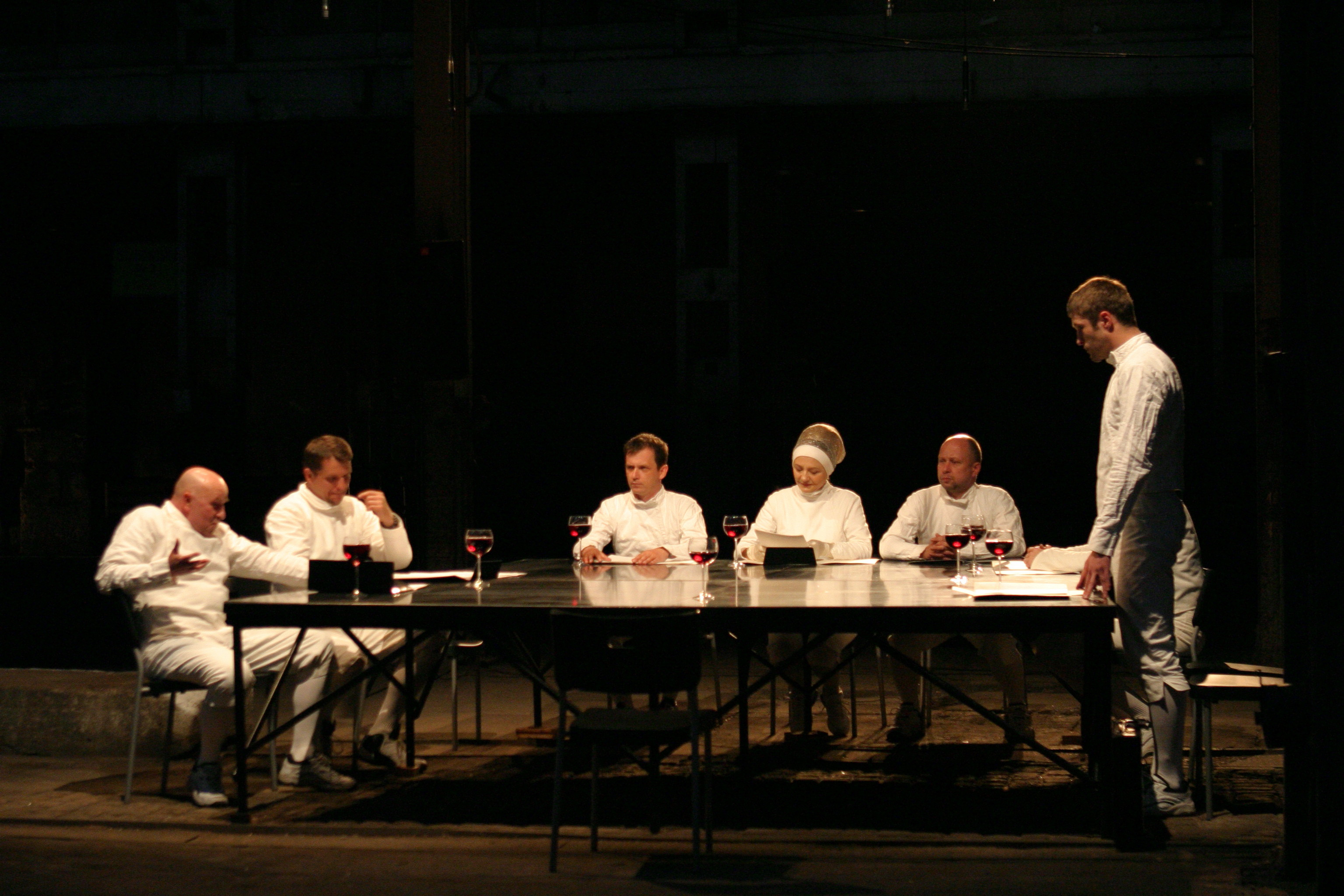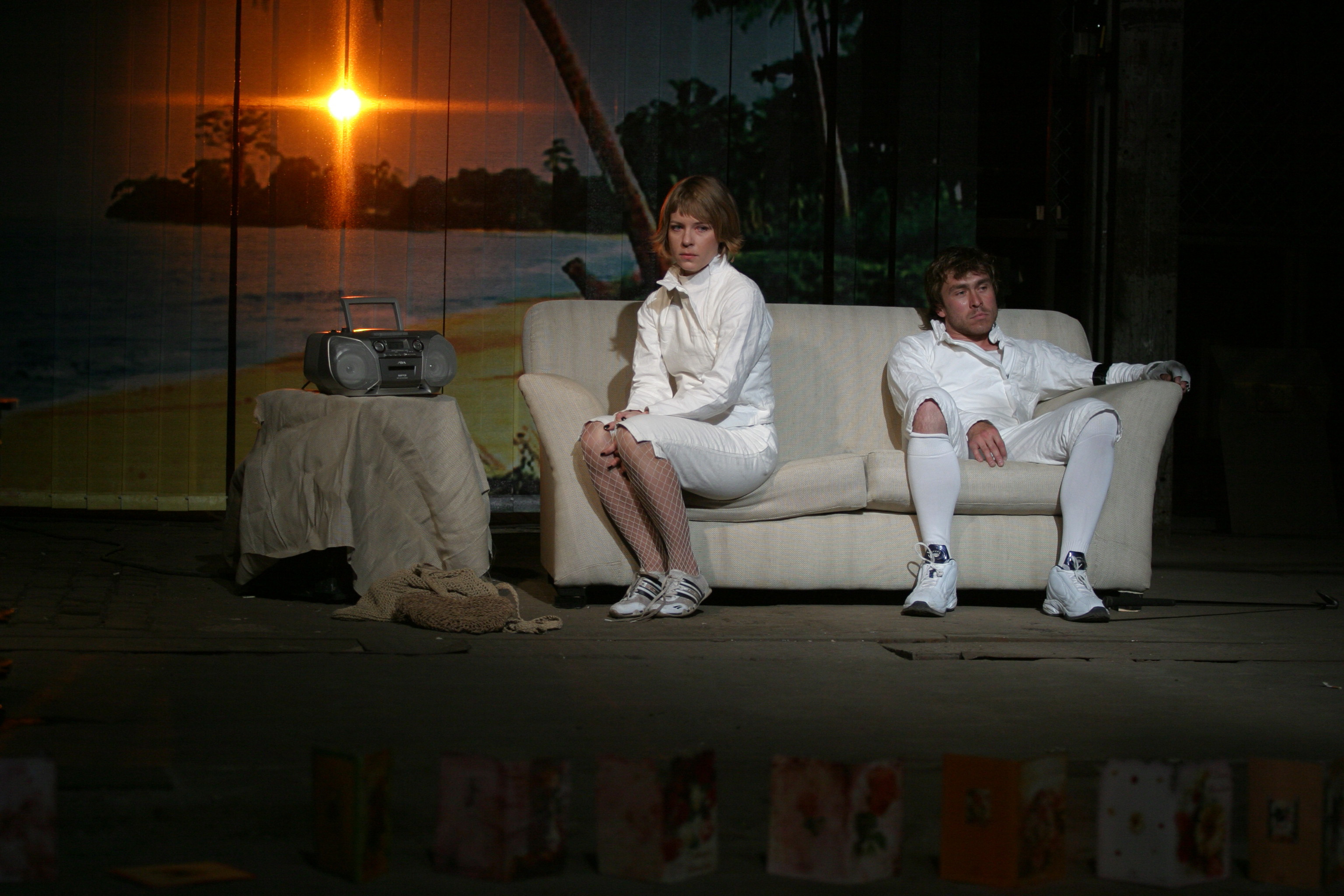Marek Beylin

H., dir. Jan Klata, photo by Wiesław Czarniawski
Theatre in Poland functions in the climate of two threats: pressure from authorities, in particular local ones, forcing politeness and obedience, and from hard market-related ideologies according to which culture is to be above all a well-selling entertainment industry. These threats are different in nature, yet they are not separate, since a frequent argument used by those decision makers who are not favourable towards artists’ freedom is the fact that public money should not be allocated for artists’ whims and shady experiments.
Such attitude of the authorities and economic dogmas hit the key mission of the theatre that I consider to be public theatre. It encompasses critical reflection on the present and past, and a quest for new forms of expression. This is, besides, the theatre that we have all over Poland; never before have theatres in cities and towns been creating a joint national laboratory, vivisecting our genealogies, identity myths, hopes, fears, disappointments and inhibitions. It is with fascination that I observe how theatre has been accompanying Poles in their adventures with democracy, revealing its good and bad sides. Yes, I sometimes get angry with that clear domination of what is dark, dangerous, hypocritical in theatre, as if our world was only like that. Bit in my irritation I realize that this is how conscience works. Public theatre is for me a kind of theatre-conscience, which investigates where the evil is, delves into threats, exposes our lies and mystifications, puts in front of our eyes the humiliated and excluded ones, in particular those who are normally deprived of their voice, who live beyond the horizon of our experience. And through this dispute it shows us where our chances for a more dignified world are, or chances for us becoming better or truer.
This huge rush of the theatre to talk about public world and the corners of our selves struggling with reality stems – as the whole authentic culture does – from the striving at truth, at revealing what really exists, though sometimes hidden behind a veil of fossilized beliefs. From there comes the rush to experiment and exceed in theatre, to accompany our existence in an inquiring manner. And since nothing is known beforehand about what experiments and excesses will turn out to be valuable, public theatre should allow for maximum freedom of such quests. Particularly in the name of the truth that Hannah Arendt called the utmost value in life, the sacrifice of which “for the survival of the world would be more futile than the sacrifice of any other principle or virtue”(1).
However, as we all well know, truths can be dangerous and rarely is there a good season for truth. Truths anger audiences, hurt them and put many decision makers wishing peace and comfort of power in conflict with the art. Therefore, in many places in Poland local authorities think of how to discipline artists so that they would become part of the authorities’ entourage, and not criticise them. This awakes my concern, the more so as both the theatre industry, as well as the ministry of culture are helpless faced with authoritarian inclinations of local governments. Local governments finance most of theatres and nobody can order them to treat critical and experimental theatre more favourably.
 H., dir. Jan Klata, photo by Wiesław Czarniawski
H., dir. Jan Klata, photo by Wiesław Czarniawski
More and more often I hear from the people of theatre that nothing can be done about this hellish concurrence of authorities not grasping art with art. One can only fall or adapt. There are, however, other solutions than blind heroism or conformism; they only require pressure and solidarity of theatre communities. Obviously, theatre will not free itself from authorities and the pressure of power, yet it can distance itself so that it would not be an official deciding directly about the fate of theatre that his office supervises. It is worth thinking about entities such as trust councils, created in every theatre and composed of people dealing with culture. Such councils would hold theatre management accountable and could – at their sole discretion – dismiss it. They would also be a good – since strong – participant of negotiations for subsidies. Moreover, they would be able to convince politicians more effectively that their prestige does not depend on artists’ availability, but on how culture blooms in their area and to what extent is it an important topic in Poland and abroad. Trust councils would thus have content-related control over public theatres and would weaken political power over them. And they should be established by the ministry of culture together with the theatre industry.
These are not just pure mirages. Such ideas are already on the way for instance in the field of museums, and in other cultural institutions they could also pay an important role. Such common need facilitates a reform, since it requires new laws, that is pressure and amassed persuasion, and the more communities engage in that change, the easier it will be. It is, therefore, worth revitalising the movement of “citizens of culture”, once very successful, nowadays dead.
Yet a good public theatre requires not only the freedom of artists and subsidies to stabilize that freedom, but also broad access to performances. A part of that theatre should be activities such as “Wielkopolska: Rewolucje” („Greater Poland: Revolutions”), which bring contemporary art closer to audiences. One cannot, however, change the whole theatrical life into a popular travelling trend, since the effect of that would be disastrous; therefore, it is necessary to confine yourself with a variant that is artistically imperfect, yet socially useful: the presence of theatres in the Internet. Recording the more important theatre achievements and making them available for free should be the responsibility of for instance the National Audiovisual Institute (NINA), or the Theatre Institute. Obviously, that would require additional funds, but since theatre lets us better recognize the world and ourselves in it, since by offering us a multitude of different stories it equips us to live among others and with others, it would be a great sin of the state to remain passive in that matter.
- Hannah Arendt Between past and future. Eight Exercises in Political Thought, Penguin Books, 199 - Philosophy
Marek Beylin